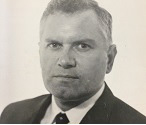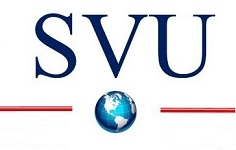 Belatedly I have heard about the passing of Andrew Eliáš, an economist and a long-time Editor of Zprávy SVU.
Belatedly I have heard about the passing of Andrew Eliáš, an economist and a long-time Editor of Zprávy SVU.
I got to know Andrej or Andrew Eliáš in Washington through the late Čestmír Ješina. As he acknowledged in his amusing, intimate autobiography, I made him join the SVU and “introduced him to the elite of the Society.” It was also at my suggestion that he was named, by the SVU Executive Board, a program coordinator of the Fourth SVU World Congress in 1968.
His life story could be made into a movie. He was born on May 5, 1926, in the industrial town of Prešov, in Eastern Slovakia, in the Šaris region. This made him a “Východniar” (Easterner) at heart, of which he was immensely proud. He still knew the dialect of the region, which is quite different from the standard Slovak. His original name was Dubravin which he changed to Eliáš, after coming to America.
As he relates in his autobiography, he had a rather turbulent youth. He was brought up by his grandmother in Prešov until he was five, after which he was returned to his mother – apparently by order of the court – with whom he then lived in a nearby village of Hanušovce nad Topl’ou. As told by his mother, who first appeared to him as a stranger, his father apparently left them and emigrated to America, where he remarried, without getting a divorce. When Andrej became a little older, he discovered some hidden documents in the house which implied that his biological father may have actually been Holz, the richest person in the village, whom Andrej’s mother had taken to the court, alleging that he was his father and claiming financial support from him. This made Andrej very unhappy, because there was nothing more humiliating and shaming in the world at a Catholic school, which he attended, than the epithet ‘Jew’, considering that Holz was a Jew, as Andrej wrote. As he also mentioned in his memoirs, he would have liked to conclude his story by revealing the identity of his real father, but his mother took this secret with her to the grave.
After finishing High School, he was drafted into the Slovak army, at a time when Slovakia had declared its independence from Czechoslovakia and became an ally of the Third Reich, following the Munich Agreement. The year 1943, however saw the outbreak of the Slovak National Uprising against the fascist regime, in which the whole Eliáš’ Unit took part. He then connected with the partisans around Banská Bystrica, with whom he got to the Eastern Front. There he joined the Soviet Army, which subsequently sent him to the liberated Košice, as a part of a newly reestablished Czechoslovak Army. As an active participant in the insurgence, he was put forward for promotion and decoration, but it was not until 1995, however, that he was rehabilitated and promoted to the rank of Major.
After the Communist takeover of the restored Czechoslovakia in February 1948, Andrew Eliáš legally immigrated to the US, which was facilitated by his wife’s American citizenship. Landing in New York, for the first three years he had to do manual work, earning, as a beginner, seventy-five cents an hour. Nevertheless, he managed to enroll at Columbia University which awarded him both a Bachelor’s and Master’s degree, followed by a doctorate in economics at New York University. While studying, he regularly contributed articles related to the Slovak Uprising to the Czechoslovak ethnic press in the US and was editor of two such periodicals.
Having acquired a Doctorate, he then joined the Department of Commerce’s Bureau of Export Administration in Washington, DC, where he specialized in Central and Eastern Europe and the Soviet Union, becoming recognized an authority on Communist economic system and the East-West trade. He was frequently invited to the Czechoslovak Embassy, as well as to other Communist Embassies in Washington, on account of his Government position relating to East-West trade. Nobody else among us would get away with something like that at that time. In the last few years, in addition to his Government job, Andrej got involved in various business ventures, with which he continued after his retirement. As he stated in his memoirs, these ventures made him a millionaire.
Andrej did not devote much space in his reminiscences talking about SVU, although he was involved quite a bit and for a number of years. In one place, he says: “I continued to meet members of the SVU, most frequently Rechcígl, who was not only the driving force of the whole organization, but also had the final say on who was appointed to what office. At his prompting I wrote some talks for the SVU Congresses and accepted the post of editor of the bi-monthly bulletin, Zprávy SVU, which the Society published.”“Rechcigl was also an expert in diplomacy. I remember how once at a meeting of the Board he noticed that one lady member kept having a go at me, and the minute I got home he was already on the phone telling me not to take it to heart. The eagle does not go after flies, he observed. Well, who would not value such a friend?” Those were nice words indeed, even though a bit exaggerated as to my importance. We became very good friends and saw each other frequently, either in the Cosmos Club, where I invited him for lunch, or some good restaurant, where I was his guest.
Elsewhere in his memoirs, he wrote: “Rechcígl phoned me often, praising me not least for my organization of the Fourth SVU World Congress. As I discovered, he had the last word in the SVU, even though he held no official post (at that time). He invited me to lunch one day and offered me the post of chairman of the Society’s publication program, which I accepted. About a week later I received my official letter of appointment from the Board. I regarded it as a great honor. After all, there were a number of Czech writers and poets who were more qualified for the position than I was, and even such notables as the writer Radimský (Petr Den) and the poet Jiří Škvor (Pavel Javor) voted for me.”
In the first few months in 1975, Andrej helped to edit the Zprávy SVU and starting in November 1988 through the years of my return to SVU Presidency, until my retirement in 2006, he was the editor-in-chief of the newsletter. He did a fantastic job. We were in frequent contact then, since I have been in the best position to keep supplying him with the news from the Executive Board and had all knowledge about the various activities in which the Society was involved.
In 2001, on his initiative, and with my encouragement, the SVU began bestowing on selected individuals the annual SVU Human Tolerance Award, bearing his name. The Award, which was accompanied by a prize of $1,000, was given to individuals whose life and work symbolized the living value of human tolerance. It was given out for several years, until the worsening of the economic situation in the country which forced Elias to withhold further support for this purpose.
We have continued meeting for an occasional lunch, but less and less frequently in the last few years. It was a shock to me when I have heard of his passing. When I contacted his son to learn what happened, this is what he wrote: “Dad fell and broke his hip and never recovered, his heart gave out 7 months later, on May 8, 2017. Dad wanted to keep it private, no obituary or big service. The service was for immediate family only. Thank you again for your kind words, Dad always spoke highly of you.”
Andrew Elias’s passing is a great loss to all of us, especially those who knew him personally. Words cannot describe what I am feeling.
Mila Rechcigl
Reference: Andrew Eliáš, I Chose America. Bratislava: Vydavatel’stvo, 2001.
